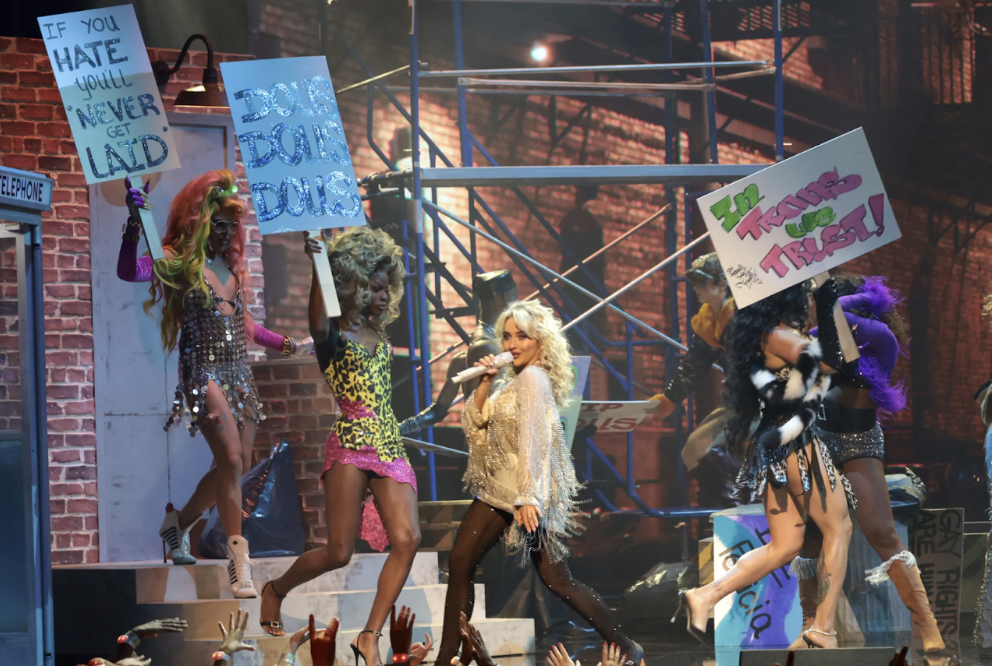Photo via Them (Photo by/Kevin Mazur/Getty Images for MTV)
***
In the era of stan culture and parasocial fandom, celebrities are given expectations beyond entertainment. They become political figures, cultural commentators, and moral leaders to their audiences. When they speak—or inversely, refuse to speak—millions pay attention. However, as more public figures adopt the language of feminism and racial equality, their advocacy often stops short of any real risk. What we are left with is a form of aesthetic activism: political posturing that flatters a brand without challenging structures of power.
Take Taylor Swift. For much of her career, Swift cultivated a “good girl” image, carefully avoiding political discourse. It wasn’t until her 2020 documentary Miss Americana that she explicitly embraced feminism and endorsed Democratic candidates. Swift’s shift was celebrated, but it also came at a moment when feminism itself had become a marketable identity.
By centering her activism on her own struggles as a white, middle-class woman, she offered a version of empowerment that was easily packaged into songs, merch, and viral moments—what critics often label as “white feminism.” In this way, even her political turn fit the logic of aesthetic activism; it is safe enough to boost her brand, but too narrow to challenge broader structures of race, class, or global inequity.
This pattern extends to newer pop figures. At this year’s MTV Video Music Awards, singer Sabrina Carpenter performed alongside several Rupaul’s Drag Race alumni such as Willam Belli, Symone, Laganja Estranja, etc., framed as solidarity with the LGBTQ+ community. On its face, the performance was bold: in a moment in time when drag shows are being targeted by legislation across the U.S, Carpenter visibly aligned herself with queer artistry.
But as TikTok creator @clios_world pointed out, Carpenter has remained conspicuously silent on issues like the ongoing genocide in the Gaza strip, where queer Palestinians face intersecting oppression under occupation. What looks like “bravery” in one context functions as avoidance in another. Supporting LGBTQ+ rights is socially accepted within mainstream pop culture, while opposing U.S foreign policy risks alienating investors and audiences.
Rep. Alexandria Ocasio-Cortez’s “Tax the Rich” dress at the 2021 Met Gala captures this same dynamic of aesthetic activism. Outwardly, the gown seemed like a bold confrontation of wealth inequity: a socialist slogan splashed across the back of a white couture dress at one of the most exclusive and anticipated events globally, but the gesture quickly drew criticism. For many, the image rang hollow—less a challenge to power than a performance staged within it.
Surrounded by billionaires and corporate sponsors at a $35,000-a-ticket fundraiser, Ocasio-Cortez’s statement became Instagram fodder, something easy to circulate but detached from material change. Similar to corporations slapping rainbow logos on products during Pride Month or luxury clothing brands selling “feminist” T-shirts, the dress reduced systemic critique to a brandable viral moment, showing how easily even radical language can be absorbed into spectacle.
Similarly, a slogan like “protect the dolls,” which has circulated on T-shirts and online communities, also shows how quickly solidarity can be reduced to style. Meant to signal support for transgender women and femme-presenting queer people, it too often becomes a fashionable catchphrase divorced from the material realities—healthcare, housing, and safety—that those communities are fighting for. This is the inherent danger attached with this kind of activism: it translates urgent struggles into consumable slogans, making support feel effortless while leaving systemic change untouched.
Spanish actor Javier Bardem shows what celebrity activism looks like when it resists being brand-safe. Unlike many stars who stick to humanitarian language, Bardem has explicitly called Israel’s actions in the Gaza strip “genocide” and used major platforms—most recently the 2025 Primetime Emmy Awards—to make his stance unavoidable. By naming the violence directly and refusing to dilute his words for the comfort of sponsors or audiences, Bardem demonstrates a form of advocacy that takes real political risk. This is the difference between performance and substance.
Where others lean on marketable slogans about world peace or equality, Bardem’s activism confronts structures of power head-on. His approach shows that when celebrities step beyond safe gestures and embrace accountability, they can use their influence to amplify marginalized voices and demand actual systemic change.
At the heart of this contradiction is capitalism. Celebrities are not just individuals; they are brands backed by managers, record labels, and corporate sponsors. This pattern is baked into the economics of the celebrity itself. What they will not allow is anything that could disrupt their bottom line: critiques of U.S foreign policy, systemic racism, or capitalism itself.
It’s easy to fall into the trap of reposting a celebrity’s infographic on instagram or applauding a star for coming out as “political” without asking what that actually means for the societies we live in. If we’re honest, a lot of social media consumers treat activism like an accessory—something to curate online, not something to practice in their own communities. But communities aren’t backdrops for an aesthetic: they’re where people are living with the very issues those celebrities you idolize commodify.
If you really want to call yourself an ally or activist, stop treating celebrity politics like gospel. Challenge it. Ask: who benefits from this performance, and who is left out? When you cheer on a celebrity’s vague “pro-Latino” or “pro-queer” or “Black lives matter” post while actively ignoring the voices of said diasporas in your city, school, or workplace, you’re missing the point entirely. Real activism should mean amplifying local and marginalized voices, showing up for grassroot groups, and recognizing how power operates in your own backyard.
So here’s the challenge. Next time you feel the urge to post a pastel-colored infographic from a pop star, ask yourself how you could redirect that energy into something tangible—volunteering, donating, or even just listening to peers who actually live the issues you aestheticize. People have power: you ultimately choose what narratives you legitimize. Stop rewarding performance. Start demanding substance.
***
This article was edited by Brett Poggi and Amethyst Kirwin.
